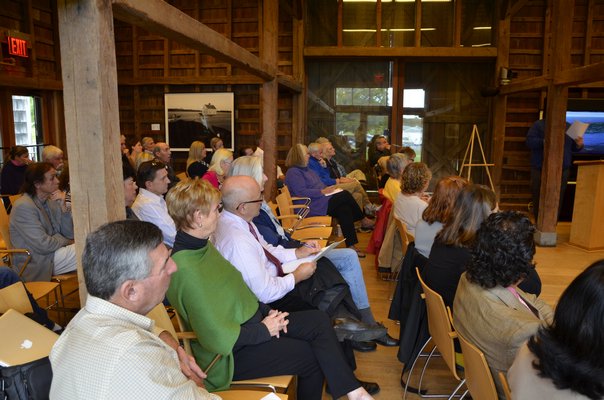
East Hampton Town Board members got an earful at their Tuesday morning work session from residents who strongly oppose the board’s proposed rental registry law.
The first of two planned discussions on the law, the public hearing was colored with negative comments from homeowners who rent their homes and who see the law as an infringement on their constitutional rights. It was often stated that the town already has a law on its books to deal with overcrowding and excessive turnover.
“This draconian measure will not only be burdensome but will result in unintended consequences to the community,” said resident Beverly Bond. “This is a frightening overreach by the board. I feel this is all a charade.”
The law, if approved, would require owners of rental properties to register with the town’s Building Department and obtain a rental registration number. The goal is to cut down on the excessive turnover from illegal short-term rentals throughout the town.
The law would require owners of rental properties to pay an application fee and register a property by filling out a one-page form and providing an affidavit about the number of people they will rent to, the number of bedrooms and the square footage of each bedroom, the proposed rental period, and if there is a valid certificate of occupancy. They would have to acknowledge that there would be refuse removal weekly for the entirety of the rental period.
Once the form is completed, the homeowner would be given a rental registration number that would be listed in any rental advertisements for the property.
If anything were to change, such as when a new tenant comes in, or the lease expires or is renewed, the homeowner would be required to file again with the registry.
Any information the town collected could be used as “presumptive evidence” of a rental that has over-occupancy or a multi-family occupancy, which would help the town if it were attempting to prosecute someone who abused the system.
Anyone failing to register would face violations, which could escalate to a misdemeanor criminal charge with possible fines and imprisonment.
Many residents and landlords said the town’s proposal would punish those who abide by the rules and rent their homes out of necessity.
“Let’s not let a few bad apples cloud the reality here,” said broker and homeowner Alexander Peters. “The board needs to stop criminalizing weekly rentals and wake up to the fact that this is where the market is. The rental market is the economic lifeblood of our town.”
David Siegel of Amagansett said he and his family have rented their home continuously to one family every summer, and through that practice they’ve been able to not only live here and keep their home, but they have also supported the town’s economy by hiring pool companies, carpenters and lawn maintenance companies over the years. He said he would rather see the Town Board enforce the rules rather than add another layer of legislation that could hurt the economy.
“I do nothing wrong in any way, sense or shape,” he said about his rental. “The only people who truly get hurt by this registry are law-abiding citizens. You need to go after the others.”
But according to Assistant Town Attorney Michael Sendlenski, the law would enable the Building Department and code enforcement to better track who isn’t following the rules and more easily and fairly prosecute them.
“All we’re requesting in the affidavit is the number of people that the homeowner is expecting as part of the lease. If the tenant is beyond that, that provides the town a way to charge the tenant and the owner for the same thing. But if the owner limited the number of people on the property, and it is over-populated, then it’s more on the tenant,” Mr. Sendlenski said. “We can then move forward with prosecution of the tenant as opposed to the owner.”
Still, however, residents seemed to resist the idea of giving the town more control over rental properties. They insisted that better enforcement and tougher laws are the key to solving the problems with rentals.
“The people who are here are representing themselves as the community of people who abide by the code,” Wainscott resident and occasional landlord Jose Arandia said. “The people that cause the problems are not here, and they’re not going to be here, because they didn’t care about their neighborhood to begin with, so they do not care if there is a registration or not. Let’s let the Town Board and code enforcement do their job by giving additional teeth to the process.”
Mr. Sendlenski said he and the Town Board would consider the public’s comments from Tuesday but is looking forward to hearing more public input at the next informational session at the Montauk Firehouse on Wednesday, November 12, at 10 a.m.
“We realize how important summer rentals are, and that parents have put their kids through college, and renting has helped many people get over the hurdle of meeting expenses,” Town Supervisor Larry Cantwell said. “The rental business and home rentals is dynamic, with deep history in our community, and a very important economic driver for people’s lives and the local economy. The last thing we want to do is take that away. This is not a threat on our part—we’re just addressing the situation.”